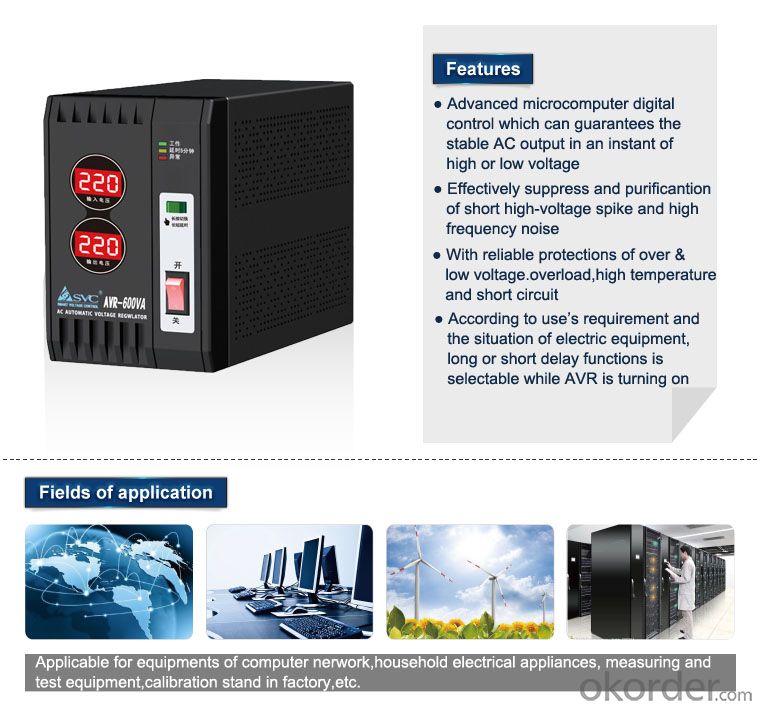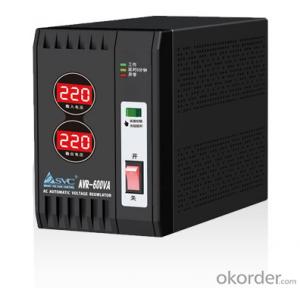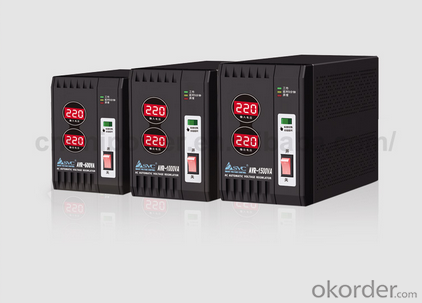Stabilizer High-efficiency Egypt AC Power Voltage Stabilizer
- Loading Port:
- China main port
- Payment Terms:
- TT OR LC
- Min Order Qty:
- 20 carton
- Supply Capability:
- 10000 carton/month
OKorder Service Pledge
OKorder Financial Service
You Might Also Like
Egypt AC Power Voltage Stabilizer 
Product Description

| Model | AVR-600VA | AVR-1000VA | AVR-1500VA |
| Rated power | 600VA | 1000VA | 1500VA |
| INPUT | |||
| Input voltage range & frequency | 160~280VAC/Same as AC | ||
| OUTPUT | |||
| Output voltage range | 220VAC±10% | ||
| DISPLAY | |||
| LED digital display status | Input voltage, output voltage | ||
| LED display status | Normal, Display, Fault | ||
| PROTECTION | |||
| Protections | Over & low voltage, overload, high temperature, short circuit protection | ||
| ENVIRONMENT | |||
| Environment of performance | Temperature 0℃~40℃, Humidity 20%~90% | ||
| Noise level | Less than 40dB | ||
| PHYSITAL | |||
| (kg) / Net weight (kg) | 2.3 | 2.9 | 3.6 |
| (mm) / Unit dimention (mm) | 205*108*157.5 | ||

1. Wide range of input voltage
The UPS can offer normal and stable service voltage under its input voltage range. When the input voltage is out of its range the machine will switch to battery mode automatically to keep the output power in order to protect the equipment, such as computers, ensure they will not be damaged by the over high or over low voltage, users can continue the operation of equipment for a while or save the data on computers while the power network is abnormal.
2. Wide range of AVR(Automatic voltage regulation)
In the product’s input voltage range and under 3 steps of intelligent AVR function, it can provide a stable output voltage.
3. Automatic self detection when UPS on(LED).
Before the UPS on, red, yellow, blue LED will light up two times by cycle turns, after self detection UPS switch to AC mode/battery mode or working mode.
4. Silence function
In the "battery mode", shortly press the switch to turn off the buzzer. But the battery is about to run out or the load is too heavy, the buzzer sound cannot be muted.
5. Overload protection
In the battery mode, output voltage turn down correspondingly when it is overload, after the capacity of load is lower than the rated power then output voltage will back to rated value, it ensures the UPS will not shut down by abrupt overload which caused by surging current during the computer is working and other equipment is added.
6. Short circuit protection
When the mis-operation caused the load short circuit or computer failure (such as power tube breakdown of switch) cause short circuit, the UPS will shutdown automatically for protection.
7. The low current switch
This UPS adopts low current switch to extend the service life which is longer than conventional battery and high current switch in AC current path.
8. Automatic charging
There are two charging mode, charging time is faster than ordinary charging mode, higher efficiency, and greatly prolonging the service life of the battery.
9. With a bypass output
Independent bypass output socket for external printers or scanners of computer peripherals, with surge protection of the load.
- Q: How do solar energy systems affect the resale value of a home?
- Solar energy systems can have a positive impact on the resale value of a home. Studies have shown that homes equipped with solar panels tend to sell faster and at a higher price compared to homes without them. This is because solar energy systems offer numerous benefits, such as reduced energy costs, potential tax incentives, and a smaller environmental footprint. Additionally, as renewable energy becomes increasingly popular, homes with solar panels are often seen as more desirable to buyers, making them a valuable investment.
- Q: Can solar energy systems be used for powering water pumping systems?
- Yes, solar energy systems can be used for powering water pumping systems. Solar-powered water pumping systems use photovoltaic (PV) cells to convert sunlight into electricity, which can then be used to power water pumps. This provides a sustainable and cost-effective solution for pumping water in remote areas or locations without access to electricity grids.
- Q: Can solar energy systems be used in powering community centers or social organizations?
- Absolutely, community centers or social organizations can definitely utilize solar energy systems to power their facilities. Solar energy is an eco-friendly and renewable power source that can cater to various electricity needs such as lighting, heating, and running electrical appliances. To meet the electricity requirements of their members or visitors, community centers and social organizations often consume a significant amount of energy. By installing solar panels on their rooftops or in nearby open spaces, these organizations can generate their own electricity and reduce their reliance on the traditional power grid. One of the major advantages of utilizing solar energy systems is the long-term cost savings they offer. Although the initial installation costs may be higher compared to conventional power sources, solar panels have a lifespan of 25-30 years and entail minimal maintenance. Consequently, over time, the investment made in solar energy systems can be recouped through reduced electricity bills. Additionally, solar energy systems are environmentally friendly as they produce no greenhouse gas emissions during operation. By harnessing solar power, community centers and social organizations can play a role in mitigating climate change and diminishing their carbon footprint. In areas prone to frequent power outages, solar energy systems can provide a reliable source of electricity. By incorporating battery storage systems, excess solar energy can be stored and utilized during periods of low or no sunlight, ensuring uninterrupted power supply to the community center or social organization. Furthermore, solar energy systems can serve as an educational tool for social organizations to raise awareness about renewable energy and sustainability. By showcasing the advantages and viability of solar power, these organizations can inspire community members to consider adopting clean energy solutions in their own homes and businesses. In conclusion, solar energy systems are a feasible and sustainable option for powering community centers or social organizations. They offer cost savings, environmental benefits, reliability, and educational opportunities. By embracing solar power, these organizations can set an example and contribute to a more sustainable future.
- Q: Can solar energy systems be used for powering air conditioning in commercial buildings?
- Yes, solar energy systems can be used to power air conditioning in commercial buildings. Solar panels can generate electricity that can be used to run air conditioning units, reducing the reliance on traditional energy sources and helping to lower energy costs. Additionally, solar energy systems can be integrated with energy storage solutions, allowing for the continuous operation of air conditioning even during periods of low or no sunlight.
- Q: Can a solar energy system be used to power electric vehicles?
- Indeed, electric vehicles can benefit from the utilization of solar energy systems. Sun-absorbing panels can be conveniently mounted on rooftops or other appropriate surfaces to harness sunlight and transform it into usable electricity. This generated power can subsequently be employed to charge the batteries of electric vehicles, thereby offering a clean and sustainable energy source. In fact, numerous individuals have already embraced solar energy to fuel their electric cars, paving the way for a greener and more environmentally friendly transportation alternative. Furthermore, continuous progressions in solar technology have enhanced its efficiency and affordability, rendering it an increasingly feasible choice for powering electric vehicles.
- Q: Are there any limitations to installing a solar energy system in a homeowner's association?
- There are potential limitations to installing a solar energy system in a homeowner's association (HOA). Although some HOAs have embraced renewable energy and implemented guidelines to facilitate solar installations, others may have restrictions or limitations. One possible limitation is the HOA's adherence to specific aesthetic guidelines or architectural standards. This means that the solar panels must be installed in a manner that aligns with the overall design and appearance of the community. In certain instances, this could result in limitations on the panels' size, location, or visibility. Another limitation is the impact on property values. While solar energy systems are generally viewed as a desirable feature, certain homeowners may have concerns regarding their effect on property values. Consequently, the HOA may require an approval process, including a review conducted by a committee or board, before permitting installation. Furthermore, limitations may exist related to the structural integrity of the property. The weight of solar panels can be substantial, and certain roofs or structures may not be able to handle the additional load. To ensure that the installation will not compromise the building's integrity, the HOA may demand a structural assessment or engineering report. Lastly, limitations may arise from legal and regulatory requirements. Depending on the jurisdiction, specific permits, licenses, or agreements may be necessary for solar installations. The HOA may be responsible for obtaining all required documentation and approvals, which can complicate and prolong the installation process. In summary, it is essential for homeowners to carefully review their specific HOA guidelines and engage in open communication with the association in order to understand any limitations or requirements that may be in effect.
- Q: How does the quality of solar panels affect their performance?
- The quality of solar panels plays a crucial role in determining their performance. High-quality solar panels are designed and manufactured using advanced technology and materials, which directly impacts their efficiency, durability, and reliability. Efficiency is one of the key factors affected by the quality of solar panels. High-quality panels are built with superior materials and advanced manufacturing techniques, allowing them to convert sunlight into electricity more efficiently. This means that they can generate more electricity from the same amount of sunlight compared to lower-quality panels. Durability is another important aspect influenced by the quality of solar panels. High-quality panels are designed to withstand harsh weather conditions, such as extreme temperatures, strong winds, and heavy snow loads. They are also less prone to degradation, ensuring a longer lifespan and consistent performance over time. Reliability is closely tied to the quality of solar panels. High-quality panels are built to last, reducing the chances of malfunctions or breakdowns. They undergo rigorous testing and quality control processes to ensure that they can consistently deliver their rated power output for many years. Additionally, high-quality solar panels often come with industry-leading warranties, providing peace of mind to the owners. These warranties cover defects, performance issues, and other potential problems, ensuring that customers receive support and replacements if needed. In summary, the quality of solar panels significantly impacts their performance. Investing in high-quality panels can lead to higher energy production, increased durability, and improved reliability, ultimately resulting in better returns on investment and a more sustainable energy solution.
- Q: Can a solar energy system be installed in areas with high seismic activity?
- Yes, a solar energy system can be installed in areas with high seismic activity. However, it is crucial to ensure that the system is designed and installed to withstand the potential impacts of seismic events. Several measures can be taken to enhance the system's resilience, such as: 1. Reinforced Mounting Structures: Solar panels are typically mounted on structures, such as rooftops or ground-mounted frames. These structures should be designed to withstand seismic forces, including the possibility of ground shaking. Reinforced materials and additional bracing can be used to make the mounting structures more robust. 2. Flexible Wiring and Connectors: Solar panels are connected through wiring, and special consideration should be given to the installation of flexible wiring and connectors. This allows for some movement during seismic events, reducing the risk of damage or disconnection. 3. Secure Panel Installation: Solar panels should be securely fastened to the mounting structures to prevent them from dislodging during an earthquake. Additional measures, such as using specialized clamps or adhesives, can be taken to enhance the panel's stability. 4. Proper Grounding: Ensuring proper grounding of the system is essential to protect against electrical surges and potential damage caused by seismic events. It is important to follow local electrical codes and guidelines to ensure the system is safely grounded. 5. Regular Inspections and Maintenance: Regular inspections should be conducted to identify any potential issues or damage to the solar energy system. Prompt maintenance and repairs can help mitigate any risks associated with seismic activity. By following these guidelines and working with experienced professionals, a solar energy system can be successfully installed and operated in areas with high seismic activity.
- Q: Can solar energy systems be used for powering electric drone systems?
- Yes, solar energy systems can be used to power electric drone systems. Solar panels can be integrated onto the drone's structure, allowing them to capture sunlight and convert it into electrical energy to power the drone's propulsion system and other onboard electronics. This renewable energy source offers a sustainable and environmentally friendly alternative to traditional battery-powered drones, enabling longer flight times and reducing the reliance on non-renewable energy sources.
- Q: Can solar energy systems be used in multi-story buildings?
- Yes, solar energy systems can be used in multi-story buildings. Solar panels can be installed on the rooftop or on the sides of the building, depending on the available space and orientation to the sun. Additionally, advancements in solar technology have made it possible to integrate solar panels into building materials such as windows and facades, allowing for more efficient utilization of solar energy in multi-story buildings.
Send your message to us
Stabilizer High-efficiency Egypt AC Power Voltage Stabilizer
- Loading Port:
- China main port
- Payment Terms:
- TT OR LC
- Min Order Qty:
- 20 carton
- Supply Capability:
- 10000 carton/month
OKorder Service Pledge
OKorder Financial Service
Similar products
Hot products
Hot Searches
Related keywords




















